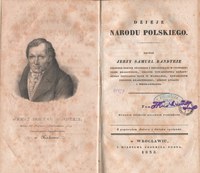The Polish Section (P)
The Polish section is the largest after the Russian one. Its basis was formed by three private libraries: of Tomasz Ruśkiewicz (1867–1926), Eugeniusz Barwiński (1874–1947) and Marian Abramowicz (1871–1925). Their purchase enriched the section with numerous rare printed books from the 16th–18th centuries, material for the study of the earliest Polish history, chronicles, statutes, codes of law as well as works of prose and poetry. The Polish collection contains documents concerning the contacts between Poland and Moscow, the wars that Poland led or monographs on the history of the 19th and 20th centuries. From the founding figures of Polish historical science, the authors abundantly represented by their works include e.g. Joachim Lelewel, Oswald Balzer, Tadeusz Korzon, Adolf Pawiński, Bolesław Limanowski, Władysław Smoleński, Michał Bobrzyński, Wojciech Kętrzyński and Szymon Askenazy. Literary history is represented by works of Ignacy Chrzanowski, Piotr Chmielowski, Aleksander Brückner, Stanisław Windakiewicz and many others. The section contains numerous works by the linguists Jerzy S. Bandtkie, Jan Baudouin de Courtenay, Jan M. Rozwadowski and Jan Łoś. There is a large collection of the works of the most important representative of Polish ethnography and folklore Oskar Kolberg. The library continuously procured scientific writings published by scientific and educational institutions; among them, one should mention mainly the Ossolineum in Lviv, which was moved to Wrocław after the Second World War, Akademia Umiejętności in Kraków, Poznańskie Towarzystwo Przyjaciół Nauk, and scientific societies in Cracow, Warsaw, Toruń or Lviv.
The section contains a rich collection of fiction, especially the Polish classics Mickiewicz, Słowacki, Krasiński, Orzeszkowa, Prus, Żeromski, Reymont, Sienkiewicz, Wyspiański, Kasprowicz and others, frequently in the first or other rare editions. Nevertheless, the author represented by the highest number of volumes (more than four hundred) is Józef Ignacy Kraszewski, after all the most productive Polish writer of all. Periodical publications are represented for instance by: Kwartalnik Historyczny (1887–1928), Rocznik Krakowski (1898–), Rocznik Slawistyczny (1908–), Wisła (1887–1922), Ateneum (1876–1901), Ruch Literacki (1960–) etc. The most complete of dailies is Czas (1848–1939), of newspapers between the two wars Kurjer Warszawski and Kurjer Poznański. Among bibliographers, one has to mention at least Karol Estreicher and mainly his work Bibliografia polska XIX stulecia, which was chronologically followed by the currently published Bibliografia polska 1901–1939, and Gabriel Korbut with his bibliography Literatura polska od początków do wojny światowej (1929–1931), followed by the multi-volume bibliographical edition, known under the general title Nowy Korbut.
The collection is complemented by the Polish exile literary production; in the second half of the 20th century, it was represented by Instytut Literacki in Paris, including the not entirely complete set of the magazine Kultura.















